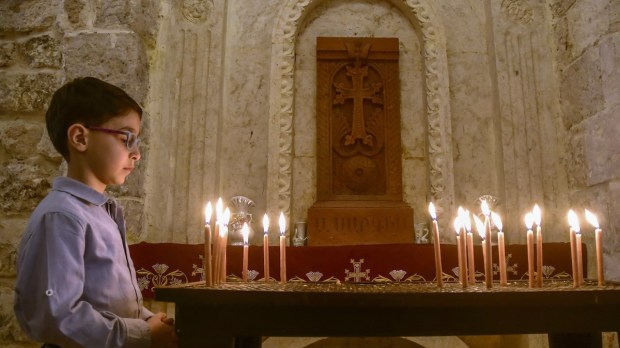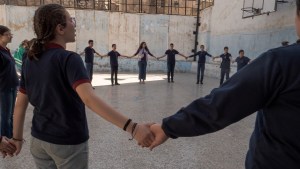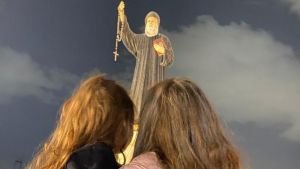When a devastating 7.8-magnitude earthquake hit parts of Syria and Turkey on February 6, 2023, the newly retired Melkite Catholic Metropolitan of Aleppo, Archbishop Jean-Clément Jeanbart, was trapped in his residence in the northern Syrian city. Most of his building had collapsed, claiming several other lives, including a priest who also lived there. Archbishop Jeanbart, 79 at the time, was carried by rescuers off the building’s balcony.
During his convalescence from a broken leg, the archbishop had a growing conviction that the Lord had saved his life for a specific purpose. Syria itself had suffered a kind of earthquake for more than a dozen years. Civil war and an Islamist insurgency had led to much destruction and disruption of life. The Islamic State group had threatened a way of life in which Christians and Muslims lived in harmony.
Though ISIS has been defeated militarily and the civil war has morphed into a low-grade conflict, Syria continues to suffer from turmoil. One of the potential victims of the ongoing turmoil is Christianity itself, carried from ancient times by a community that is struggling to deal with economic hardships.
A mission
Archbishop Jeanbart, in his retirement, has taken up the mission to preserve Christianity in its homeland.
In March, a year after the major earthquake, which took the lives of more than 62,000 people in Syria and Turkey, he launched a program he calls Working to Stay.
“The most important problem now is to stop the emigration, which could eliminate the Christian presence,” Archbishop Jeanbart told Aleteia.
Syrians who are able to leave the country are doing so – for financial, not security, reasons. Security, the archbishop clarified, is good in Syria. “Perhaps it’s better than in Europe,” he quipped. “We very seldom have violence between people.”
The reason for the economic woes is multifaceted but includes sanctions that the US and Europe have imposed on Syria. And inflation.
“Inflation has made everybody poor – even those in the middle class are suffering now from the high price of items they need,” he said. Prices for food, fuel, and clothing are exorbitant.
At the same time, salaries are “insignificant” now due to the exchange rate. A US Dollar now costs about 14,000 Syrian Pounds. Before the beginning of the Arab Spring in 2011, it was less than 50 Pounds to the Dollar.
Christian population decimated
The Christian population has likewise been decimated over that time period, going from about 170,000 to about 40,000 in Aleppo alone. That includes people who belong to the Orthodox Church of Antioch, Syriac Christians, Armenians, Maronites, Latins, Chaldeans, and others. Archbishop Jeanbart’s own Melkite Greek Catholic Church’s population plummeted from 22,000 to around 8,000 to 9,000.
In 2019, the archbishop wrote that the prosperity Aleppo once enjoyed and that “placed her among the most important cities of this region has lost its aura. The innumerable attacks which have destroyed its factories and its flourishing industry, its infrastructure and social and administrative institutions, its commercial area and its legendary souks, its ancient homes, its schools, and its hospitals have reduced the city to misery and its population to extreme poverty. Through the destruction of this city, Syria has lost one of its main sources of economic growth and social improvement.”
“Our families try to do what is possible to live but they are very miserable,” he told Aleteia. “I feel it, I see it with my eyes. Many of our people have lost a good part of their money. A large number of them eat so little that they have changed physically. But most important are the children and schools. Families don’t have enough money to pay for the schooling of their children and even to pay for milk and what their babies need. We do what we can to help them, but the problem remains a problem of income and the problem of high prices.”
“So when I go to visit families, I pay attention not to accept any offering or anything, because I know that this will cost them a lot,” he said.
Working to Stay
His new initiative, Working to Stay, evolved out of a longstanding “Building to Stay” program. It uses the Center for Professional Formation that he set up to train people in the trades, and perhaps begin a business that will generate a better income than the poor wages regular jobs offer.
“Sometimes, a plumber or carpenter gets more money than a physician,” he said. “And they have much more to do, and it’s harder to find them than to find a physician.”
Jeanbart has been able to help people in other ways as well. A dentist was on the verge of emigrating because independent energy dealers who owned generators had jacked up their prices so much that he could not longer afford the electricity needed for his dentistry equipment. The archbishop arranged to get the man a solar power system instead.
Yet another man was able to purchase a small pickup truck outfitted with a bar from which he could sell coffee, soft drinks, and other items. “He can move around the country, and he doesn’t have to pay for a location or pay taxes,” the archbishop said.
Meanwhile, Church life itself is fairly stable, and people are attending Sunday and daily liturgies normally.
“The church is a place where they can find some peace and some tranquility and perhaps also some help,” Archbishop Jeanbart said. “We try to help them as much as we can. We give them food or help to buy some. To be healed, we have a medical center. We have schools; we have professional schools. We have the movements and scouts and apostolic movements, lay movements, and they are working in a good way.”
Churches that had been damaged or destroyed during the war have been rebuilt and restored thanks to NGOs and the Government of Hungary, he said.
The Syrian government, he added, respects the Church and protects it. “To give you an idea, the apostolic nunciature is allowed to have a card which facilitates the travel and movement of the clergy, when we present it at a checkpoint.”
Muslims open to the Gospel
But the Church’s greatest resource is her people, and one reason Archbishop Jeanbart is keen to keep any more of them from leaving is that the Islamic world is open to hearing the Gospel, he maintains. Arab Christians who live in Syria are the most appropriate witnesses to share the Word with their Muslim neighbors, he said.
Remaining in the country allows Christians to be faithful to Christ’s demand to bear witness to Him and bring him disciples, Jeanbart said.
“I am convinced that the best testimony to Islam for Jesus Christ are the Arab Christians living in this country,” he said. “We are from this country – long before Islam came. We have the same language, we have the same culture and national history. We have the same objectives. We live together, we work together, we go to school and university together. We are very close to our brother Muslims.”
He said that until recently it was impossible to help a Muslim become a Christian because “the Islamic laws are very tough. A man who leaves Islam might be killed. Now, things are changing day by day.” The digital revolution has diminished the importance of official censors, and Jeanbart believes that the new freedom of expression will lead more Muslims to pursue their own questions about “the new life given by Jesus Christ.” If an inquirer is in close proximity to Christians, such as through friendships, “he will go and ask for more explanation about what he heard.”
In one recent missive to supporters, the archbishop speaks of “a multitude that believes in God the Creator [who] await the Good News of the coming of Jesus Christ the Savior. The Savior whom the Christians of the country, mandated by the Lord, are called upon to make known.”
The help Archbishop Jeanbart’s project has been able to provide so far is paying off.
“All of them are really happy, and their happiness makes me happy and makes other people think that it is not impossible that we can find a way to live in this country,” he said.
Syrian Christians “begin to have another choice, not just the choice of leaving the country but a choice to try to find work, to go on in the country.”
For more information



